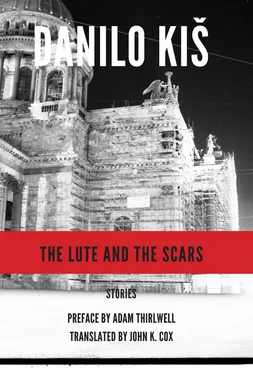“Sir, I’m not tired.”
And he kept running, around and around in circles.
“I command you to stop and catch your breath!” the race official screamed at him, his face beet red; he waved the flag up and down, up and down. “That’s an order!”
Valdemar called back to him over his shoulder, without breaking his stride:
“But, sir, if I stop now. ”
“You must stop this instant, Number 25. I order you to halt! Did you hear me? Knock it off!”
“At the half-way mark?” Valdemar groaned, continuing to run and looking in vain for a passage through the rusty wire.
“It’s for your own good,” the umpire shouted, forgetting for a moment to wave the little flag. “If you don’t believe me, No. 25, here’s a person here who will convince you that it’s in your best interests. You are tired.”
At that point Maria appeared from the tent at a sign from the official. (This low-ceilinged tent apparently served as a command post, and it was equipped with a field telephone.) He recognized her even before she began to speak, although her straw hat covered half her face with its shadow.
“Valdemar,” she shouted to him. She was scared of something, “I implore you to stop! Come, take a rest. You must rest, Valdemar!”
Then he woke up. The dream crumbled like the stack of ashes on the end of a long-burning cigarette. Waking up felt like a fall, like the fall of an angel. Had he not been ranging through paradise itself just a short while ago? Maria, whose voice still resounded clearly in his mind, had been dead — to keep this in some sort of coherent perspective — for more than fifteen years.
Outside the day was dawning, dirty and gray.
There was still enough time to tell his dream to the man lying next to him in the bunk of this Siberian labor camp. After Valdemar’s sudden death, however, the latter man told the story to another prisoner who is also now dead. Thus Valdemar’s dream reached Abram Tertz, who used to tell his wife all sorts of things in his letters. The camp censor scarcely paid any attention to Tertz’s letters anymore, since he carried on like an idiot in them and was more likely to write about God, the devil, and Gogol than about the weather, diarrhea, and the lousy makhorka .
Tertz concluded the story of the unfortunate man from Latvia with this laconic comment (in this letter to his wife he still needed to save space for Providence and Gogol’s nose): “He had precisely 12 years and 6 months to go before the end of his sentence.” On the next page (p. 76) of the London edition, he added, in a separate context and yet somewhat paradoxically: “Sleep is the watering place of the soul to which it hastens at night to drink at the sources of life.”
Recently, while reading the book by Tertz, I remembered Šejka’s story. (I am more and more convinced that he had to have had a copy of the manuscript.) He narrated the course of events in his own way, referring frequently to Berdyaev, Dostoyevsky, and Beckett. He was lonely, sick, and Russian. And he knew how to bathe his story in the same mysterious light that emanated from his paintings.
Danilo Kiš (1935–1989) remains best known in his native Serbia and in the world of translation as a novelist. If one throws into his dossier the fact that his fiction was mildly (and bravely) postmodern and that the Holocaust was one of his main themes, we will have just about reached the end of our popular, journalistic understanding of the man and his works. Yet the refinement, even the reframing, of Kiš’s profile continues as we move well into the third decade following his premature death of lung cancer in Paris. Recent years have seen the publication of more and more scholarly articles about the methods and themes of his works, as well as the translations of some additional stories, an early novel, and a play; in Serbia there are even new primary sources coming to light, such as the two Kiš film scripts, published in late 2011 as Dva filmska scenarija , and the occasional rebroadcast of his 1989 collection of filmed interviews in Israel with “double victims” of fascism and (early) Yugoslav communism, Goli život (Bare Life). The new trends arising from this publishing activity — trends that supplement but in no way supplant the basic Western critical understanding of Kiš originating in his “family cycle” of novels and stories and in the carefully selected, cosmopolitan essays brought out in the English-language version of Homo Poeticus during the war-torn 1990s — could arguably be summed up as increased attention both to the Yugoslav milieu depicted in his writings and to his artistic and ethical aversion to Stalinism. There are a number of other jewels awaiting their turn to speak to audiences in translation, and Kiš’s life itself still awaits a great biography, in any language. The publication of this volume is, in my opinion, a bracing new chapter in Serbian and East European literature, and. one might add. it represents only a fraction of the excellent work that still remains inaccessible in English.
The seven stories contained in this version of The Lute and the Scars do not have an overarching common theme. They do, however, all very much bear the stamp of the author’s mind and touch. They are enjoyable, by turns intimate and politically obstreperous and sad and even funny, and their diversity will allow a fuller appreciation of Kiš’s thematic concerns and, possibly, his stylistic approaches. One of the stories, “The Stateless One,” reflects themes explored elsewhere in Kiš’s oeuvre — here, the difficult relationship of an artist to his work and skepticism about modern nationalism — though, even so, it is unique in choosing a (real) late Habsburg novelist as its protagonist. “Jurij Golec” is a touching and elegiac treatment of the last days and legacy of a Soviet refugee writer in Paris; it is without doubt one of this translator’s favorite stories in the volume, by dint of its alternating tones of sadness and levity, as well as its serving as a reminder of the existence of a little-known Holocaust novel, Piotr Rawicz’s Blood from the Sky , which ranks alongside key works by Aharon Appelfeld, David Grossman, Aleksandar Tišma, and Kiš himself among the indispensable fictional treatments of Nazi genocide. “Jurij Golec” is also the cosmopolitan equivalent of the very Yugoslav and very political account of a man of letters driven to desperation by ideological and physical brutalization at the hands of the secret police that we find in “The Poet.” Also rooted firmly in the Serbian context, and beautifully and humanely demonstrating Kiš’s respect for Nobel Prize-winner Ivo Andrić, for whom he had enormous but seldom discussed admiration, is “The Debt,” a stream-of-consciousness final will and testament of the great writer in his final days in the hospital. “A and B” is a short but challenging autobiographical essay that condenses many of Kiš’s unconventional views about the “brutality” of Central Europe and the nobility of the Balkans (an inversion of the typical epithets); this is also the thematic register of his great novels Garden, Ashes and Hourglass . Finally, “The Lute and the Scars” is another colorful autobiographical piece that depicts bohemian Belgrade in the 1950s, the cold, lingering Stalinism of the USSR, and the struggle of a young writer to find authenticity and maintain personal integrity. “The Marathon Runner and the Race Official,” also bearing the imprint of inimical Soviet conditions, memorializes the precariousness — the mortal condition of being pitilessly “exposed,” if you will — of the marginalized and marked outsider: Kiš’s preferred formula for the concept of “victim.” Each of these stories is anchored in Kiš’s biography or in literary history more generally.
Читать дальше












